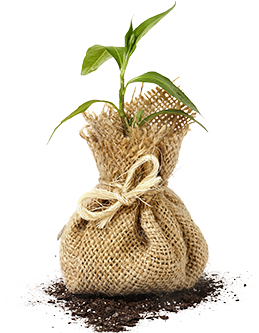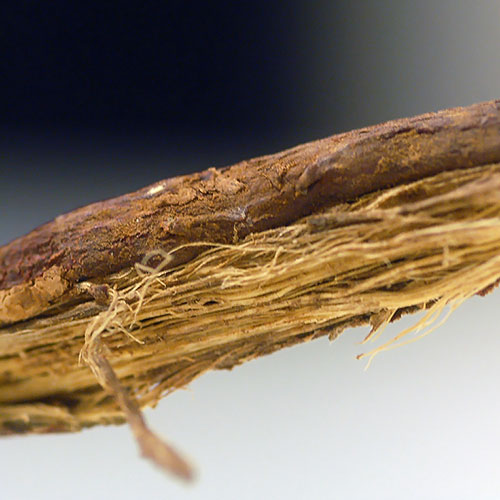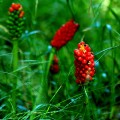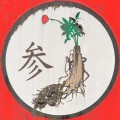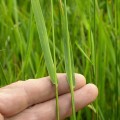The licorice is mentioned by Theophrastus in the 3rd century BC. as "farmakao" (medicine) for asthma. The name comes from the Greek and means sweet root, said natural flavor. Originates from southern Europe, Egypt and parts of Asia. Now cultivated throughout Europe EKYO Scandinavia and in America, Australia, China. It is said that Napoleon chewed pieces of liquorice. The licorice is shrub 50-100 cm, with roots that reach 1-2 measure, cylindrical, branched and fleshy. These are used for therapeutic purposes. The stems of the plant are upright, striated, strong and fluffy, The leaves are pinnate, the flowers of the plant are usually cyan color and appear in early summer. Licorice we see it in large colonies at low altitude and land fallow and uncultivated.
Department used: The entire root, in chips or powder. The part of the plant that is under the ground, eradicated in autumn, washed and dried in the Sun. Need 3-4 years, before the root of the collection to reach status. This dried sweet root of the plant with the rootlets, is one of the most used and most educated pharmaceutical Medicinal teas throughout the world, especially in China, where is present in most fytotherapeytikes formulae (in Chinese medicine the use here and 3000 years!)
Ingredients of liquorice:
- Glycyrrhizins
- Tannin
- GLUCOSE, SUGARS
- Liquorice ACID (6-10%)
- GLYKYRITINI
- CALCIUM SALTS, MAGNESIUM
- Asparagine
- ESTROGEN (STEROIDS)
- AMINES (1-2%)
- PTITIKA ESSENTIAL OILS (0.05%)
- KETONES
- KOUMARINES
Healing properties of liquorice:
The juice from the roots It gives the commercial licorice. Used for masking the unpleasant taste of other drugs or Tn its calming effect on the cough. The dried root, minus the bitter bark, recommended for colds, sore throat and bronchial catarrh. The licorice is mild laxative. Reduces the levels of stomach acid, from the rest.* heartburn. Has a significant ability to treats stomach ulcers , because it overlaps with the protective gel walls. It also facilitates the movement of the colon. Increases the flow of bile and reduces the levels of cholesterol in the blood. It acts as a expectorant, softener, inflammatory, acts on the adrenal gland, is antispasmodic and mild laxative. The herb is useful in problems spleen, gastritis and peptic ulcer, colic and primary adrenokortikoeidiki deficiency. Has a positive effect on bronchial catarrh, bronchitis, pneumonia and cough. Also, acting positively to problems stress. To problems Arthritis where received corticoids formulations, helps to improve adrenal function. It is diuretic and is recommended by the diabetes and of the cholesterol.
INDICATIONS
ANTIFLEGMONODES, COLD, Pneumonia, Bronchitis, Nasopharyngitis, Laryngitis, ASTHMA, Gastric ulcers, IBS, SYNDROME CROHN, Aerophagy, Indigestion, POLYCYSTIC, OVARIES, STONE IN KIDNEY, Hyperkalemia, LIVER PROTECTION, Cholecystitis, Antidiabetic, Dropsical, HEAVY MELGCHOLIA, Aplastic anemia, Scleroderma, RHEUMATOID ARTHRITIS, Hyperprolactinemia, HERPES, REDUCTION LIPODOUS TISSUE, FRESHNESS BREATHING
Ways to use liquorice:
Decoction: Simmer 30 g. liquorice on 20 minutes 2 cups of water. Take three or four times a day from 1/4 cup. You can add the same amount in other types of tea or decoction.
Relaxing: 1 teaspoon powdered liquorice mixed with sugar.
Licorice for gastritis and stomach problems:
For setting digestive problems chewed the dried root.
One of the most drastic teas available for the treatment of gastritis is licorice. The herb produces a mucus in the stomach which is deposited on its walls, reducing acid secretion. To prepare, will mix in 1/2 liter of boiling water one tablespoon of licorice powder, You leave for 10 minutes and then will the strained juices. Drink this tea cold, 2-3 times a day before meals
Contraindications to the use of liquorice and side effects of taking licorice:
The Licorice should not be taken from hypertensive individuals.
Taking large doses and prolonged use of licorice, may be responsible for: PONOKEFALOUS, MUSCLE WEAKNESS, TOXIC TO THE LIVER, HEART, May cause swelling, LOW TESTOSTERONE, Fluid retention, Abdominal pains, Sodium retention, Potassium loss, AVOID diuretics, Heart medicines, FOR SUGAR, Relaxant, CORTICOSTEROIDS, PILLS affecting serotonin, ANTISYLLYPTIKA, ANTICOAGULANTS, LITHIUM, Interferon, And other herbs or preparations, HIGH AND ESTROGEN PROLACTIN, RECRUITMENT OF GRAVITY, PERIODIC PARALYSIS THYROTOXIKI, VISION PROBLEMS, NOT IN EGLYMOSYNI, REPLACER
Guests currently searching, are reading here for: Licorice, stomachoy therapy with herbs elkos, stomachoy physical therapy elkos, glykoriza powder use, diabitiki neyropatheia herbs, Elki Ms essential oils, use glykorizas, glykoriza phyto, foto glykoriza, botano for ulcer.







